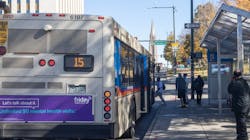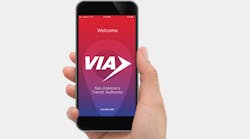Rider experience improvements from Denver RTD, VIA Metropolitan Transit
The Denver Regional Transportation District (RTD), VIA Metropolitan Transit are introducing new ways to make riding transit easier for its riders.
RTD
RTD has introduced predicted arrival times into its Next Ride interactive voice response (IVR) system, enabling customers to call the agency’s Customer Care number and hear when any fixed-route bus or train is expected to arrive at a specific stop.
The improved technology replaces the scheduled stop times that previously were provided when RTD customers called Customer Care to locate a vehicle in real time. A notable improvement Next Ride IVR provides is more accurate speech recognition, enabling callers to better interact with the system without using a touch-tone keypad. Should certain words be detected that suggest the customer needs to speak with a Customer Care agent – including "I need help" or "I don't know" – the call will be automatically transferred. The quality of the system's voice has improved, too, with the use of a Neural Text-to-Speech (NTTS) voice engine that uses machine learning to offer richer, more lifelike speech quality.
Next Ride IVR was built entirely by RTD’s IT staff, who worked in earnest on this project for more than a year. The small, talented team that was involved is passionate about delivering solutions that improve the customer experience and spend public money wisely. With the debut of this system, RTD will save hundreds of thousands of dollars in development, support and maintenance costs that would have been incurred through an outside vendor. And by keeping the project in-house, staff can make changes, such as adjustments to a script, within minutes if needed.
VIA Metropolitan
VIA Metropolitan Transit has added an option for riders to purchase transit tickets through the Ubeapp using Uber Transit Ticketing. The platform is powered by Masabi’s Ticketing SDK.
VIA Metropolitan explains the option expands access to transit for San Antonio residents and visitors alike who may have previously not considered using VIA’s services. Once riders have selected their route, they can choose to purchase transit passes using their existing payment profile. Once purchased, tickets are stored in the “Transit Tickets” section of the Uber app, and users can activate them when boarding the bus even when they are offline.
“We’re excited to expand the fare options for riders through this offering,” said VIA President and CEO Jeffrey C. Arndt. “With this launch, customers can use the latest ticketing technology to plan and pay for multi-modal trips in San Antonio and Bexar County.”
By making mobile ticketing available in more applications, VIA is ensuring its customers have flexible fare payment options for trips on any VIA service, including bus, van and VIA Link trips. For VIA, it ensures mobile ticketing is instantly available to an already established user base providing a seamless and convenient experience to transfer to or ride public transit. Uber represents an additional sales channel for VIA next to VIA’s own goMobile+ app and in turn makes the ticketing experience for its passengers easy and accessible.
“We’re excited to be working with VIA and Masabi to bring yet another transit agency's ticketing into the Uber app,” said Jen Shepherd, global head of Uber Transit. “Having a greater variety of transportation options helps to make it easier to live a car-light lifestyle, and with tickets available directly in the Uber app, riders are now able to purchase fare tickets seamlessly and with more flexible options.”
Brian Zanghi, CEO of Masabi, notes the collaboration with Uber and VIA Metropolitan supports Masabi’s goal of creating a seamless experience for passengers using transit and shared mobility services.
“VIA has been at the forefront of agencies launching modern technology and payment options, increasing accessibility to transit. Today’s launch builds on these foundations, delivering seamless access to Uber’s users for public transit,” said Zanghi.

Brandon Lewis | Associate Editor
Brandon Lewis is a recent graduate of Kent State University with a bachelor’s degree in journalism. Lewis is a former freelance editorial assistant at Vehicle Service Pros in Endeavor Business Media’s Vehicle Repair Group. Lewis brings his knowledge of web managing, copyediting and SEO practices to Mass Transit Magazine as an associate editor. He is also a co-host of the Infrastructure Technology Podcast.






